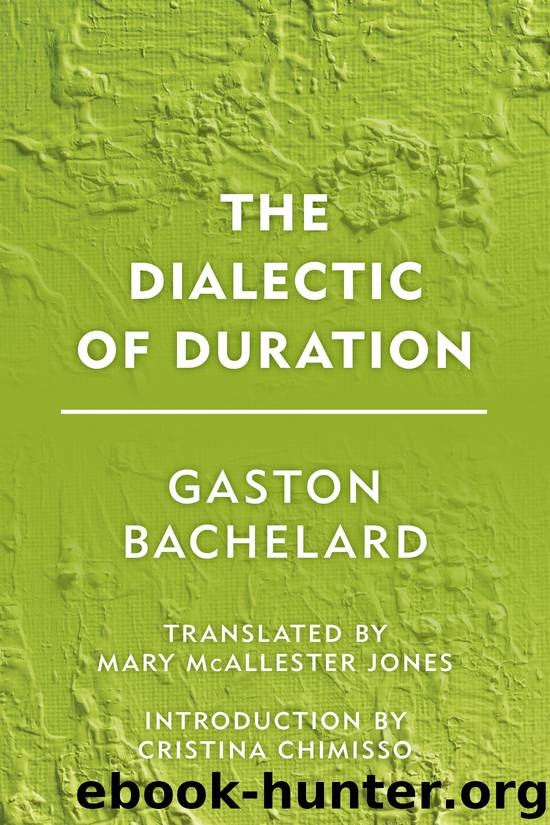The Dialectic of Duration by Gaston Bachelard

Author:Gaston Bachelard
Language: eng
Format: epub
Publisher: Rowman & Littlefield International
Chapter 4
Duration and Intellectual Causality
I
67
Our intention in taking the problem of temporal effectiveness into the domain of physics was simply to confront possible objections and to conform to philosophical custom: it is in fact usual to want time to be, to begin with, an objective power and to see movement as giving us the clearest measure of duration. It seemed to us that in this domain itself, temporal links were neither as strong nor as uniform or general as they are said to be. The thread of time has knots all along it. And the easy continuity of trajectories has been totally ruined by microphysics. Reality does not stop flickering around our abstract reference points. Time with its small quanta twinkles and sparks.
68
It is not though by reflecting on physical phenomena that we can really feel the metaphysical duality of duration. In objects, in fact, breaks remain accidents and elude all attempts to systematise them. In higher psychic activity, breaks are on the contrary inseparable from reasons; or better, the small variations in energy involved in higher psychic activity bring about new ideas. Here we can say that small variations have great effects. Our mind, in its pure activity, is an ultra-sensitive time detector. It is very good at detecting the discontinuities of time. For this to happen, all we need do is turn aside from all practical chores and all social cares, and listen to time’s cascades within us.
Furthermore, physical or physiological phenomena would always teach us to submit to time and be an object among objects. A whole aspect of the phenomenology of time is obscured when we limit ourselves to reflecting on the development of phenomena. Their kinematics can so easily be described that we come to believe that their dynamic character is less certain, less general, and more concealed. In actual fact, the history of science shows fairly clearly that dynamics is added to kinematics as secondary and derived knowledge, which is harder and more fallacious.
Yet if we leave objective reflection and come to our own innermost experience, everything changes and what was obscure becomes clear; the experience of inner dynamics now moves to the fore while that of our movements seems derived and secondary. From this standpoint, movements seem to us to be simply the consequences of our decisions, taking into consideration—which is very important—the difficulties of carrying out our decisions. We must not neglect this very first and wholly intellectual aspect of the difficulty of our acts. It is this aspect that can best teach us about active time. In any case, when the dynamic and the kinematic are studied in ourselves they should give two very different impressions of time.
69
And there is more besides. In us, the dynamic initially appears in the form of impulses, jerks, and rushes of feeling, in short in a discontinuous form. And to illustrate the dialectic of the continuous and the discontinuous in relation to time, the simplest is perhaps to confront our movements and the original order of the will that governs them.
Download
This site does not store any files on its server. We only index and link to content provided by other sites. Please contact the content providers to delete copyright contents if any and email us, we'll remove relevant links or contents immediately.
Enlightenment Now: The Case for Reason, Science, Humanism, and Progress by Steven Pinker(7314)
A Journey Through Charms and Defence Against the Dark Arts (Harry Potter: A Journey Through…) by Pottermore Publishing(4811)
The Immortal Life of Henrietta Lacks by Rebecca Skloot(4589)
A Journey Through Divination and Astronomy by Publishing Pottermore(4385)
Elon Musk by Ashlee Vance(4128)
Origin Story: A Big History of Everything by David Christian(3692)
COSMOS by Carl Sagan(3625)
Alchemy and Alchemists by C. J. S. Thompson(3522)
Bad Pharma by Ben Goldacre(3428)
Enlightenment Now by Steven Pinker(3370)
Shadow of Night by Deborah Harkness(3370)
Inferior by Angela Saini(3316)
A Mind For Numbers: How to Excel at Math and Science (Even If You Flunked Algebra) by Barbara Oakley(3308)
Origin Story by David Christian(3202)
The Code Book by Simon Singh(3189)
Signature in the Cell: DNA and the Evidence for Intelligent Design by Stephen C. Meyer(3139)
The Elements by Theodore Gray(3058)
A Brief History of Time by Stephen Hawking(3026)
A Journey Through Potions and Herbology (A Journey Through…) by Pottermore Publishing(2852)
